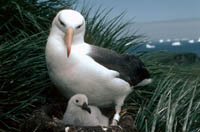PREVENTING THE NEEDLESS SLAUGHTER OF THE ALBATROSS
UPDATE: The Race is on. Ellen Macarthur and the 2005/6 Volvo Race have joined the Campaign
Learn all about it HEREContents | Photos | Crew |Log | Press | RSPB

ALBATROSSES ARE DYING IN THEIR TENS OF THOUSANDS.
ALMOST FOREVER, THESE MAGNIFICENT BIRDS HAVE FLOWN UP TO 2,600 KILOMETRES A DAY AROUND THE SOUTHERN OCEAN. BUT SOON THEY WILL BE NO MORE. ILLEGAL LONGLINE FISHING WILL KILL THEM ALL.
I could not stand by and watch this happen. So, in 2003, I put together and funded, an entirely independent voyage round the world, aimed at raising public awareness to the plight of the old Bird, so as to prevent its needless slaughter. My volunteer crew, experts in their fields, gave up a year of their lives to help me. This was the very most we could do at that time.
To save the Albatross, all that is needed is a willing captain - on every fishing boat.
John Ridgway, Ardmore, IV27 4RB NW Scotland. June 2005.In late July 2003, under the flag of the United Nations Environment Programme, the yacht English Rose VI sailed from Ardmore, NW Scotland, bound for the Southern Ocean. Once in the South Atlantic, the yacht headed eastward, following the great bird’s circumpolar track right round the world, crossing the fishing grounds and stopping at Cape Town, Kerguelen, Melbourne, Wellington and Port Stanley in the Falkland Islands along the way.
Throughout the voyage, a direct link with the Internet, to www.savethealbatross.org (on BBC’s H2G2 website), was used to share images and stimulate discussion, with a world-wide audience, about how the needless slaughter of the symbolic albatross, could and must be prevented.
This was my third circumnavigation in this boat. Married forty years and a 65-year-old grandfather, State Pension Book in hand, Marie Christine and I were deliberately un-sponsored.
It was a personal effort.
In April 2004, two months before we were due to return to a high-profile Reception at London’s Tower Bridge, UK finally signed ACAP. We had gathered 105,000 signatures from 131 countries, which we went on to present to the United Nations Food and Agriculture Organisation in Rome, in June 2004.
At a Reception on the 18 June near Tower Bridge, the following letter from Prince Charles was read out,
 14th June, 2004 Dear John, I am so very sorry that I cannot be at Tower Bridge to welcome you and Marie Christine home after your epic voyage. But I did just want to congratulate you on the typically direct and personal way you have chosen to highlight the plight of the albatross. Raising awareness of the plight of a group of birds that most people have never seen, and probably never will see, is a huge challenge. Yet the interest your voyage has sparked around the world is evidence that people really do care - once they know just how serious the situation has become. I know you feel as strongly as I do that these magnificent birds cannot be allowed to slide quietly into extinction, and particularly not when the damage is both entirely man-made and easily preventable. The most potent force driving the members of the albatross family into extinction is, of course, indiscriminate long-line fishing, which is estimated to kill 100,000 albatrosses every year. Fishermen operating in responsible and well-regulated fisheries have adopted measures that almost entirely eliminate the death of albatrosses from long-lining. Setting lines under water, or only at night, trailing a bird-scaring line and prohibiting offal discharge while fishing have all proved effective. Many fisheries also insist on the presence of observers on board to monitor results. While you have been on your travels, an international agreement on the conservation of albatrosses and petrels (known as A.C.A.P.) came into force. This was a huge achievement because it is legally binding on the countries that ratify it. The UK played a leading role in drawing-up this key international treaty and was, together with countries including Australia and New Zealand, among the first to sign and ratify it. That, of course, is the good news, The bad news is that many countries with fishing interests in the southern oceans still need to ratify the A.C.A.P., and some of the most important appear unlikely to do so - for reasons which can only be guessed at. At the same time, the problem of illegal, unregulated and unreported fishing - which you specifically set out to highlight - appears to be getting worse. I don't know whether you will have encountered any of them during your voyage, but there are believed to be more than a thousand of these substantial pirate vessels, operating under 'flags of convenience', recognising no rules and with few exceptions - evading every sort of sanction and penalty available under international law. What I find quite extraordinary is that when an International Plan of Action to tackle the problem of pirate fishing was being negotiated under the auspices of the United Nations, several countries made strenuous efforts to water down the draft provisions. In particular, the opportunity to take effective measures against the use of chartered vessels in illegal, unreported and unregulated fisheries was missed. I just wonder how many of those countries claim to be committed to 'sustainable development'? When you visit the United Nations in Rome, I do hope you will suggest that they put increased pressure on the countries that are not willing to co-operate actively with the international efforts to stamp out pirate fishing... I look forward with great interest to hearing about the voyage, and about the various discussions you have been having in the ports you have visited, but for now I hope you both have a wonderful and thoroughly well-deserved welcome in London, a successful visit to the United Nations and a safe trip back to Ardmore. 
|
Now go to the Contents and visit other pages about the Voyage.



